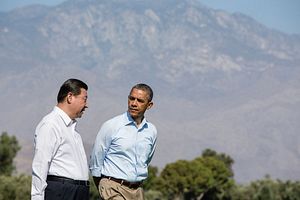On the eve of U.S. President Barack Obama’s eight-day trip to Asia, Thomas E. Donilon, until recently the president’s National Security Adviser, provided The Washington Post with an overview of America’s strategy in Asia. He makes no reference to “pivoting” to Asia—the new catchphrase is “rebalancing.” Instead of being portrayed as increasing its commitment to the region, the United States is now said to be merely restoring its commitment to a previous, unspecified level. For instance, the number of American troops in the area, which was decreased as units were moved from Asia to the Middle East, is being restored to its pre-Afghanistan and Iraq level. This emphasis on rebalancing is supposed to reassure U.S. allies in the Middle East and Europe that they are not being abandoned or even short-changed—and to reduce the concerns the pivot has raised in China.
The problem with this fig leaf is that it is too small for what it seeks to cover. The U.S. clearly is moving to increase its military commitments to the region. For example, Donilon himself refers to “expanding” the American naval presence, “strengthening” military alliances and partnerships, and “[deepening] the U.S. commitment to Asia’s security,” as well as “placing a greater emphasis” on economic and diplomatic efforts through the drive to strike a Trans-Pacific Partnership.
Much more serious is that the overview, like many such statements before it, reflects the strategic confusion that bedevils the U.S. approach to China and the region. Donilon writes that U.S. policy has been “caricatured” as containment and that “the United States has a good deal of experience with containment—and a $500 billion annual economic relationship [trade with China*] does not resemble that strategy.” So if it is not containment, then what is it? Donilon says that the U.S. looks for “constructive relations” with China—about as vague a statement as they come. (The U.S. is not the only country to draw on such open-ended statements; China’s call for a “new type of great power relations” or “new type of major country relationship” is equally fuzzy.)
Moreover, the specifics speak to a rather different approach. The U.S. entered into joint naval exercises with Vietnam and a United States-Philippines Mutual Defense Treaty is expected to be signed during Obama’s upcoming visit. The United States is condoning if not encouraging Japan’s military buildup, despite the fact that Japan has engaged in acts that China finds particularly provocative. Washington also promotes a TPP that will include all key countries in the region except China (although China may well refuse to join even if invited.)
Indeed, the policy the U.S. is following in effect is more assertive than containment. Containment assumed that each power had its sphere of influence, and conflicts occurred only when one power tried to cross the line that separated the two blocs or attempted to interfere in places where no line was clearly drawn. The U.S. did not come to the assistance of freedom fighters that rose against the former Soviet Union in Poland, in Hungary, and Czechoslovakia, because they were on the wrong side of the containment line. These days, the United States is actively seeking to lure into its “camp” Asian countries considered friendly or close to China, including Burma and Cambodia, and to ally itself with countries once considered “no-man’s land,” such as Vietnam. The U.S. uses its military ships and planes to conduct close surveillance patrols of the Chinese coastlines. And although the United States now claims that the Air-Sea Battle plan (ASB) is not aimed at any particular country and is small potatoes anyway, documents published by various think tanks close to the Pentagon leave little doubt that the main target of the initiative is China and that the plan entails a major commitment to purchasing the kind of weapons a future war with China might require.
The U.S. is not the first major power to talk of peace, stability, and prosperity while—just in case—preparing for war. What is most prominently missing is a clearer indication of the circumstances that would convince the United States and its allies, particularly Japan, to change course. If China agrees to settle its disputes over the Senkaku/Diaoyu islands and Scarborough Shoal through an international court or some arbitration mechanism, would that convince Washington to cease its military buildup in the region, retract the ASB, and discourage Japan from proceeding with its own military buildup? Or would it then insist that it must still “rebalance” in case China uses force to hinder free passage on the high seas or make Taiwan part of the mainland republic? If China somehow managed to “prove” that it would do neither of these things, would the U.S. then hold out for the conversion of China into a liberal democracy or for freedom for Tibet? Is the U.S. willing to grant China any increased say in the region?
Donilon had very little to say on the conditions that would constitute a peaceful resolution of the differences between the United States and China and would prompt close cooperation between the two powers in matters concerning nonproliferation; the prevention of terrorism, piracy, and climate change; and important shared economic interests. This is a crying shame, given that both countries have pressing domestic concerns on which they ought to focus and given that the Middle East and Europe—especially following the events in Ukraine—are hardly places from which resources can be withdrawn to maintain—let alone “rebalance”—Washington’s commitments in Asia.
Amitai Etzioni is a University Professor and professor of International Affairs at The George Washington University and author of Hot Spots, Security First and From Empire to Community.
*Corrected from “TPP”. Thanks to commenter Ethan for pointing that out.

































